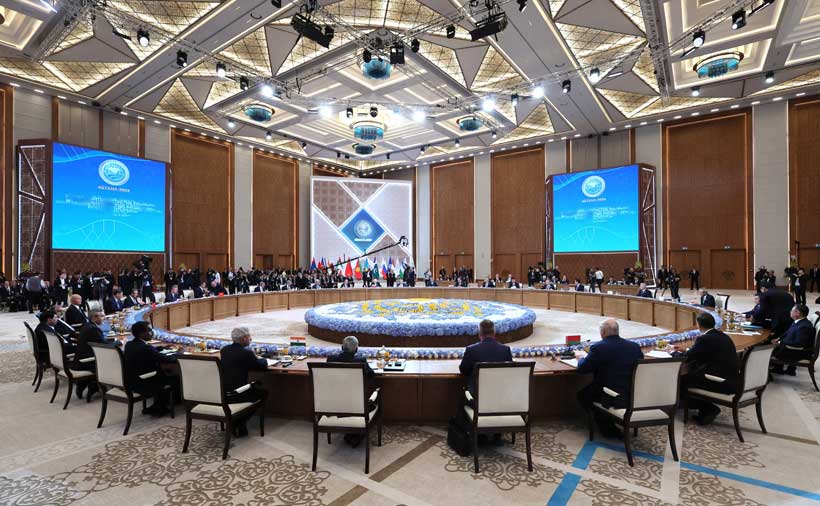The SCO Summit opens today in Pakistan, showcasing the country’s significant regional role. The Shanghai Cooperation Organisation has evolved into a crucial platform, uniting countries with considerable geopolitical and economic sway. Established in 2001, the SCO originally focused on security in Central Asia. It has since expanded to encompass economic collaboration, energy partnerships, and infrastructure development. This shift enhances its influence in Eurasian geopolitics and geoeconomics.
Spanning about 60% of the Eurasian landmass, the SCO includes over 40% of the world’s population. It features major economic powers like China and Russia, along with four nuclear states: China, Russia, Pakistan, and India. The SCO offers an alternative to Western-led forums.
The SCO Summit brings together seven prime ministers, a vice president, and a foreign minister, marking a significant diplomatic achievement for Pakistan. This hosting reflects Pakistan’s regional standing and sends a strong message of stability, despite ongoing challenges.
Economically, the summit is a golden opportunity for Pakistan. The SCO promotes trade and investment among its members, with intra-SCO trade rising from $336 billion in 2019 to $490 billion in 2023. Recognizing untapped potential, Pakistan seeks to leverage this trade, particularly through the China-Pakistan Economic Corridor (CPEC). This initiative positions Pakistan as a strategic trade hub connecting to China and Central Asia.
The summit also presents an opportunity to advance infrastructure projects, mitigate economic challenges, and enhance partnerships in energy and technology. Amid a shifting global landscape, characterized by the Ukraine conflict and Middle Eastern tensions, the SCO Summit offers a unique dialogue platform distinct from Western-dominated discussions.
Timing is critical for the SCO Summit. China and India continue to strengthen trade ties with Russia, crucial for their economies amid Western sanctions. Simultaneously, China aims to diversify its global partnerships, especially with SCO nations, while Iran seeks to solidify its economic connections within the bloc, given ongoing US pressure on its oil exports.
The SCO’s potential to develop indigenous economic mechanisms, including efforts to gradually de-dollarize, is becoming increasingly relevant. Pakistan can serve as a vital transit hub for trade, bridging South Asia and Central Asia. Russian energy and Chinese infrastructure investments could stabilize Pakistan’s energy sector and spur economic growth.
The previous SCO Summit in India highlighted counterterrorism, economic cooperation, and climate change. A key outcome was the strengthening of the Regional Anti-Terrorism Structure (RATS), promoting intelligence sharing to combat terrorism. For Pakistan, this aligns with its own security priorities, especially concerning threats from groups like the Tehreek-e-Taliban Pakistan (TTP).
This year, Islamabad aims to build on the discussions from India. Counterterrorism will remain a focal point, and Pakistan is expected to advocate for enhanced intelligence collaboration. Economically, it will promote trade liberalization and investment within the SCO. CPEC-related infrastructure projects are likely to dominate the agenda.
To maximize recent trade growth among SCO members, Pakistan may push for reduced tariffs and improved customs procedures. Joint ventures in renewable energy could also be explored in light of global climate concerns.
Despite these opportunities, there are challenges. The SCO has faced hurdles in implementing decisions due to varying interests among member states. The ongoing rivalry between China and India, and India and Pakistan, could hinder progress once again. The prior summit saw a verbal exchange between foreign ministers of India and Pakistan, overshadowing efforts for cooperation.
Expectations for breakthroughs in Islamabad are low. The SCO focuses on multilateral issues, often sidestepping bilateral disputes. However, it remains to be seen if tensions between the two foreign ministers will escalate or simply maintain the current state.
Western nations, particularly the US, remain cautious about the SCO. The growing partnership among Russia, China, and Iran raises concerns over the organisation’s geopolitical trajectory. Still, the US and its allies keep a watchful eye, particularly regarding military cooperation and regional security.
Pakistan faces the challenge of balancing its SCO engagement with relationships with Western powers, notably the US, which remains a vital economic partner. Internal political dynamics could also pose obstacles to fully leveraging the summit’s opportunities.
At this pivotal moment, it is crucial for Pakistan’s government and opposition to recognize the importance of this summit. Unity is essential, as political posturing could harm Pakistan’s reputation before visiting dignitaries.
Although previous SCO summits have seen limited tangible outcomes, the forum is key to fostering a multipolar world. Its role in promoting cooperation among major regional powers counters unilateral dominance and advocates for a balanced international order.
The SCO Summit is an occasion to celebrate collective leadership representing 40% of the global population. The pressing question remains: can this collective wisdom translate into a shared vision for global cooperation and a balanced power structure?


